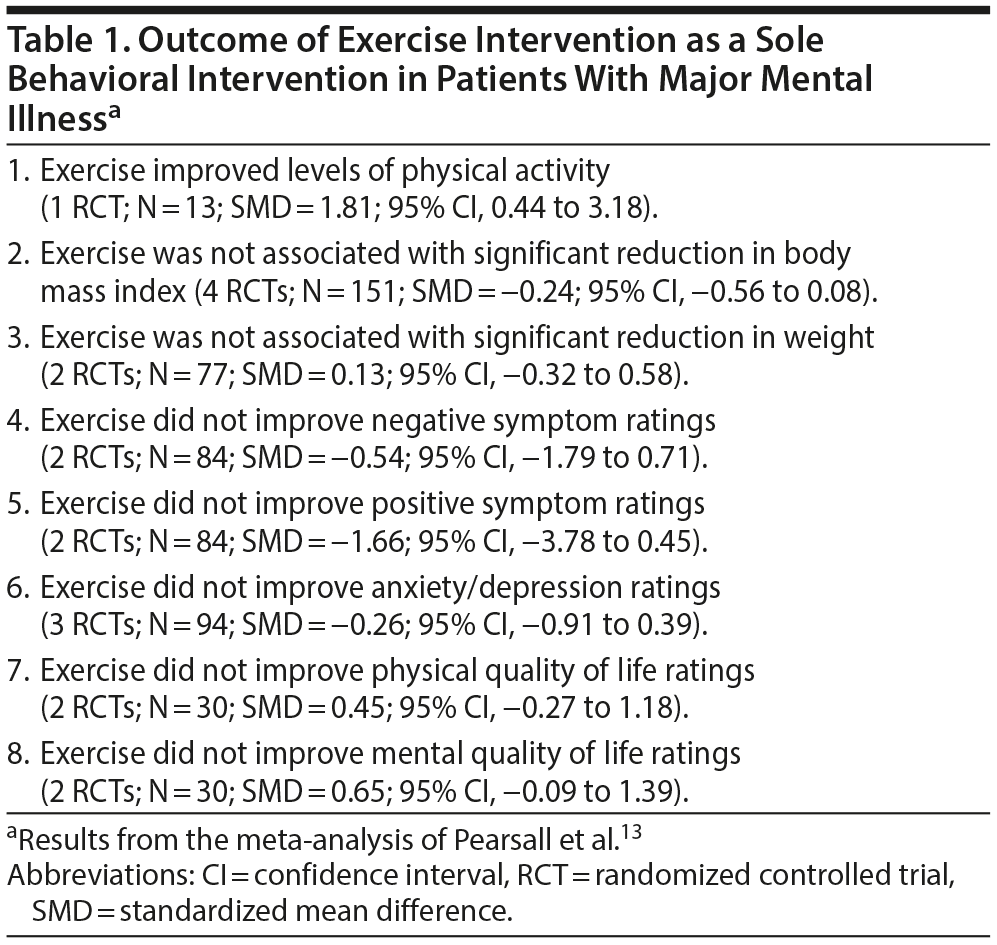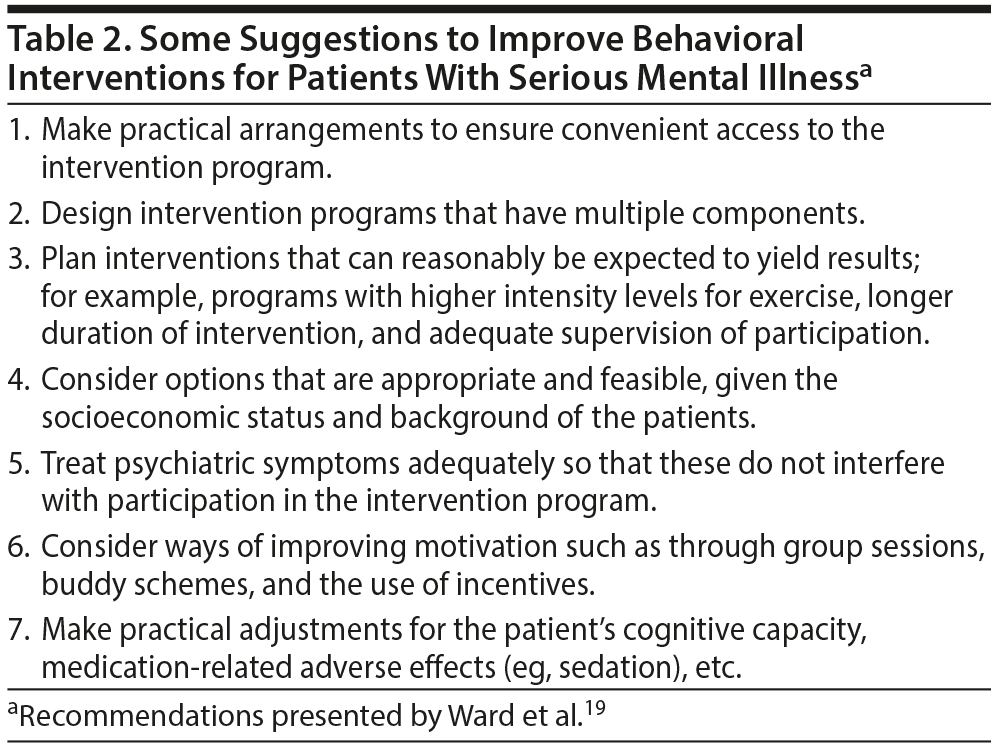Patients with schizophrenia have increased prevalence rates for many cardiometabolic risks, including the metabolic syndrome, and an increased risk of adverse cardiovascular events, including mortality. Behavioral interventions such as diet and exercise (separately and together) improve physical health outcomes in the general population. There are no studies on dietary guidance as a sole behavioral intervention for patients with schizophrenia. A meta-analysis found that exercise as a sole behavioral intervention does not result in meaningful physical or mental health gains in patients with major mental illness. Another meta-analysis found that combined diet and exercise, along with other behavioral elements, was associated with statistically significant but modest weight reduction (mean = 3.14 kg) in the short to intermediate term, but with no other cardiometabolic risk factor benefits. A large, well-supervised, pragmatic, 1-year randomized controlled trial found that behavioral interventions were not associated with health gains on a 10-year cardiovascular risk index, or on a large range of indices of physical and mental health. An added concern is that patients with schizophrenia are poorly motivated for behavioral interventions and show poor participation in such interventions. Barriers, and means of overcoming these barriers, have been identified for the implementation of behavioral programs to improve physical health in patients with serious mental illness. It remains to be demonstrated, however, that behavioral intervention programs consistently improve cardiovascular health indices in patients with schizophrenia and other major mental illnesses.
- The metabolic syndrome and its components are common in schizophrenia.
- There are no studies on dietary intervention as a sole behavioral intervention that targets physical health in patients with schizophrenia and other major mental illness.
- Exercise training as a sole behavioral intervention is not associated with improvements in indices of physical health in patients with schizophrenia and other major mental illness.
- Combined diet and exercise along with other behavioral elements is associated with weight reduction but no other cardiometabolic gains in the short to intermediate term in patients with schizophrenia and other major mental illness.
- There are many barriers to the implementation of behavioral programs that target physical health in patients with schizophrenia and other major mental illness.

ABSTRACT
Patients with schizophrenia have increased prevalence rates for many cardiometabolic risks, including the metabolic syndrome, and an increased risk of adverse cardiovascular events, including mortality. Behavioral interventions such as diet and exercise (separately and together) improve physical health outcomes in the general population. There are no studies on dietary guidance as a sole behavioral intervention for patients with schizophrenia. A meta-analysis found that exercise as a sole behavioral intervention does not result in meaningful physical or mental health gains in patients with major mental illness. Another meta-analysis found that combined diet and exercise, along with other behavioral elements, was associated with statistically significant but modest weight reduction (mean = 3.14 kg) in the short to intermediate term, but with no other cardiometabolic risk factor benefits. A large, well-supervised, pragmatic, 1-year randomized controlled trial found that behavioral interventions were not associated with health gains on a 10-year cardiovascular risk index, or on a large range of indices of physical and mental health. An added concern is that patients with schizophrenia are poorly motivated for behavioral interventions and show poor participation in such interventions. Barriers, and means of overcoming these barriers, have been identified for the implementation of behavioral programs to improve physical health in patients with serious mental illness. It remains to be demonstrated, however, that behavioral intervention programs consistently improve cardiovascular health indices in patients with schizophrenia and other major mental illnesses.
J Clin Psychiatry 2016;77(8):e964-e967
dx.doi.org/10.4088/JCP.16f11060
© Copyright 2016 Physicians Postgraduate Press, Inc.
Introduction
Overweight and obesity are common in schizophrenia, as are the other elements of the metabolic syndrome and, indeed, the full syndrome itself. Antipsychotic treatment, particularly with drugs such as olanzapine and clozapine, increases the risk of these cardiometabolic indices of risk.1-3 In consequence, patients with schizophrenia are more likely to experience adverse cardiovascular and cerebrovascular events, including earlier death.4-7 Unhealthy dietary habits8 and sedentary lifestyle9 are 2 behavioral factors that predispose to adverse cardiometabolic changes in schizophrenia; so, can diet, exercise, and associated behavioral interventions improve indices of physical health in this patient population? This article, the second in a series, examines behavioral interventions that address cardiometabolic risk factors in major mental illness with particular focus on schizophrenia.
Dietary Interventions
Antipsychotic drugs are associated with increased appetite.10 Patients with schizophrenia have a high intake of saturated fat and a low intake of fiber and fruit.8 Pearsall et al11 therefore examined whether dietary guidance (alone), with the primary aim of changing and improving dietary intake, improves health outcomes in schizophrenia; however, their systematic review of randomized controlled trials (RCTs) identified no suitable studies on the subject. Therefore, whereas dietary interventions have been shown to improve physical health outcomes in the general population,12 no conclusions can be drawn on whether or not dietary interventions (alone) improve physical health in patients with schizophrenia and related psychoses.
Exercise Interventions
Pearsall et al13 presented a systematic review and meta-analysis of RCTs of exercise as a solitary behavioral intervention for indices of physical ill health in patients with schizophrenia (and related disorders) or bipolar disorder. They searched electronic databases and other sources and identified 8 RCTs (pooled N = 374) that met their study criteria. Six RCTs focused exclusively on patients with schizophrenia and related disorders.
The sample size in these RCTs ranged from 10 to 118 (median = 30). The mean age of the participants ranged from 27 to 52 years. The nature of exercise varied widely but involved predominantly aerobic workouts; in 3 studies, the exercise was walking. The intensity of the workout was moderate in 7 RCTs. The frequency of workout varied from 2 to 4 times a week. The duration of the intervention program ranged from 10 to 24 weeks. Five RCTs were outpatient- or community-based.
Important findings from the meta-analysis are presented in Table 1. In summary, exercise improved levels of physical activity but had no impact on body weight, body mass index (BMI), positive and negative symptom ratings, anxiety and depression ratings, and physical and mental quality of life ratings.
The pooled sample comprised just 374 patients, and most of the conclusions were based on data pooled from just 2-3 RCTs, so the conclusions are tentative, at best. Nonetheless, 10-24 weeks of exercise as a solitary behavioral intervention does not seem promising as a physical health intervention for patients with major mental illness. It may also be noted that although cardiovascular fitness is poor in patients with major mental illness,14 the dropout rate from physical activity interventions is high in this population.15 In the general population, in contrast, exercise training improves cardiorespiratory fitness and biomarkers of cardiovascular health.16
Combined Exercise and Diet (With Other Behavioral Components)
Gierisch et al17 presented a systematic review and meta-analysis of behavioral and pharmacologic interventions to address cardiovascular risk factors in patients with schizophrenia and bipolar disorder. They searched electronic databases and other sources for RCTs that were at least 2 months in duration. The results presented here relate only to the behavioral interventions that included diet, exercise, and often other components, such as psychoeducation, as well, delivered in 4-24 sessions across 8 weeks to 6 months. In most of the RCTs, schizophrenia was the commonest if not the only diagnosis.
The meta-analysis found that behavioral interventions were associated with a significant reduction in body weight (10 RCTs; n = 735; mean reduction = 3.14 kg; 95% CI, 1.96-4.33 kg); however, heterogeneity was high (I2 = 78%). One study reported a significant reduction in BMI by approximately 1 unit.
Two studies found no significant effects of behavioral interventions on glycosylated hemoglobin, 2 studies found no effects on total cholesterol, and 3 studies found no effects on LDL cholesterol levels.
The CHANGE Trial
In the very recent 3-arm CHANGE trial, one of the largest, longest, and most ambitious RCTs in the field to date, Speyer et al18 randomized 428 patients with schizophrenia spectrum disorders and abdominal obesity to receive lifestyle training with care coordination and treatment as usual, care coordination with treatment as usual, or only treatment as usual.
The mean age of the sample was about 39 years. The sample was 56% female. Most patients (92%) were unemployed. The mean BMI was 34. Diabetes, hypertension, hypercholesterolemia, and daily smoking characterized 15%, 16%, 49%, and 52% of the sample, respectively. About 88% of the sample had schizophrenia, and the mean duration of illness was about 18 years.
For lifestyle training, patients were attached to designated research team members and received a closely supervised, individually tailored, manual-based intervention that sought to improve dietary habits, increase physical activity, reduce smoking, and increase receipt of medical care for somatic comorbidities. Care coordination was implemented by a psychiatric nurse and sought to ensure optimal treatment of medical comorbidities.
The findings of the study were completely unexpected, to say the least. At the 1-year treatment endpoint, there were no differences across groups on the primary outcome, which was the 10-year risk of cardiovascular disease standardized to age 60 years. There were no differences across groups in secondary and exploratory outcomes, as well, including heart rate, blood pressure, glycosylated hemoglobin level, HDL and non-HDL cholesterol levels, triglyceride level, measures of cardiorespiratory fitness, physical activity and sedentariness, weight, diet (intake of fruit, vegetables, and fish), and smoking. Relative to treatment as usual, the interventions did not improve positive and negative symptoms, cognition, quality of life, global assessment of functioning, or perceived health and perceived stress. The results did not change in various sensitivity analyses.
Psychiatric hospitalizations were fewer in the lifestyle training group than in the care coordination and treatment as usual groups (18.8% vs 33.8% vs 24.3%, respectively; significant for lifestyle vs care groups), but medical hospitalization rates were similar (12.3% vs 17.6% vs 16.2%, respectively). The dropout rate (14%, overall) differed little across groups.
An important strength of this adequately powered study18 is that it was pragmatic; there were few exclusion criteria, and there were no elements in the treatment program that were mandatory and that might have resulted in the elimination of more severely ill patients. Thus, the trial had good external validity.
Benefits of Behavioral Interventions: A Summary
Between dietary guidance, exercise training, and combined diet and exercise with psychoeducation and other behavioral elements included in the package, it appears that weight reduction is the only benefit in the short to intermediate term. This is not a small gain, in itself. However, there is no information on the number needed to treat (NNT) for clinically meaningful weight reduction. Additionally, there is little knowledge about the effects of behavioral interventions on other cardiometabolic risk factors; weak evidence suggests no benefits for glucose levels, lipid levels, and systolic blood pressure, which is a disappointment. There are no long-term data, nor data on hard outcomes such as the incidence of new-onset cardiovascular or cerebrovascular events, let alone data on NNT values for such outcomes.
Implementing Behavioral Interventions: Challenges
For reasons already stated, the CHANGE trial18 had reasonably good external validity; 83% of patients screened were randomized. We do not have related information for the meta-analysis that reported 3.14-kg weight loss with behavioral interventions17; it is possible that the studies that contributed data to this result were overrepresented for highly motivated patients who were less severely ill and hence more able to participate in the interventions. Behavioral interventions for patients with schizophrenia are difficult to implement for reasons related to poor motivation, poor participation, poor compliance, and a need for close supervision, and outcomes may be disappointing, as the CHANGE trial demonstrated.18 In the CHANGE trial,18 only 60% of patients attended at least half of the scheduled meetings (which is itself a low threshold for compliance with a treatment program).
In this context, Ward et al19 reviewed lifestyle interventions for cardiovascular risk factors in the general medical population, identified key lifestyle interventions for obesity and related risk factors, and considered barriers to the implementation of lifestyle interventions in patients with serious mental illness. Ways to surmount these barriers were suggested; some of the suggestions are presented in Table 2. Readers interested in the field are encouraged to read the review in full.19
Conclusions
Behavioral intervention programs have not been shown to consistently and meaningfully improve cardiovascular health indices in patients with schizophrenia and other major mental illnesses. Intervention programs that address known barriers (to the implementation of these programs) require to be designed and trialled for practicability and efficacy.
The next article in this series will examine pharmacologic interventions for cardiometabolic risks in schizophrenia.
 Each month in his online column, Dr Andrade considers theoretical and practical ideas in clinical psychopharmacology with a view to update the knowledge and skills of medical practitioners who treat patients with psychiatric conditions.
Each month in his online column, Dr Andrade considers theoretical and practical ideas in clinical psychopharmacology with a view to update the knowledge and skills of medical practitioners who treat patients with psychiatric conditions.
Department of Clinical Psychopharmacology and Neurotoxicology, National Institute of Mental Health and Neurosciences, Bangalore, India ([email protected]).
Financial disclosure and more about Dr Andrade.
REFERENCES
1. Mitchell AJ, Vancampfort D, De Herdt A, et al. Is the prevalence of metabolic syndrome and metabolic abnormalities increased in early schizophrenia? a comparative meta-analysis of first episode, untreated and treated patients. Schizophr Bull. 2013;39(2):295-305. PubMed doi:10.1093/schbul/sbs082
2. Mitchell AJ, Vancampfort D, Sweers K, et al. Prevalence of metabolic syndrome and metabolic abnormalities in schizophrenia and related disorders—a systematic review and meta-analysis. Schizophr Bull. 2013;39(2):306-318. PubMed doi:10.1093/schbul/sbr148
3. Andrade C. Cardiometabolic risks in schizophrenia and directions for intervention, 1: magnitude and moderators of the problem. J Clin Psychiatry. 2016;77(7):e844-e847.
4. Hennekens CH. Increasing global burden of cardiovascular disease in general populations and patients with schizophrenia. J Clin Psychiatry. 2007;68(suppl 4):4-7. PubMed
5. Tiihonen J, Lönnqvist J, Wahlbeck K, et al. 11-year follow-up of mortality in patients with schizophrenia: a population-based cohort study (FIN11 study). Lancet. 2009;374(9690):620-627. PubMed doi:10.1016/S0140-6736(09)60742-X
6. Brown S, Kim M, Mitchell C, et al. Twenty-five year mortality of a community cohort with schizophrenia. Br J Psychiatry. 2010;196(2):116-121. PubMed doi:10.1192/bjp.bp.109.067512
7. Lahti M, Tiihonen J, Wildgust H, et al. Cardiovascular morbidity, mortality and pharmacotherapy in patients with schizophrenia. Psychol Med. 2012;42(11):2275-2285. PubMed doi:10.1017/S0033291712000396
8. Dipasquale S, Pariante CM, Dazzan P, et al. The dietary pattern of patients with schizophrenia: a systematic review. J Psychiatr Res. 2013;47(2):197-207. PubMed doi:10.1016/j.jpsychires.2012.10.005
9. Stubbs B, Williams J, Gaughran F, et al. How sedentary are people with psychosis? a systematic review and meta-analysis. Schizophr Res. 2016;171(1-3):103-109. PubMed doi:10.1016/j.schres.2016.01.034
10. Deng C. Effects of antipsychotic medications on appetite, weight, and insulin resistance. Endocrinol Metab Clin North Am. 2013;42(3):545-563. PubMed doi:10.1016/j.ecl.2013.05.006
11. Pearsall R, Thyarappa Praveen K, Pelosi A, et al. Dietary advice for people with schizophrenia. Cochrane Database Syst Rev. 2016;3:CD009547. PubMed
12. Salas-Salvadó J, Guasch-Ferré M, Lee CH, et al. Protective effects of the Mediterranean diet on type 2 diabetes and metabolic syndrome [published online ahead of print March 9, 2016]. J Nutr. PubMed
13. Pearsall R, Smith DJ, Pelosi A, et al. Exercise therapy in adults with serious mental illness: a systematic review and meta-analysis. BMC Psychiatry. 2014;14(1):117. PubMed doi:10.1186/1471-244X-14-117
14. Vancampfort D, Rosenbaum S, Schuch F, et al. Cardiorespiratory fitness in severe mental illness: a systematic review and meta-analysis [published online ahead of print June 14, 2016]. Sports Med. PubMed doi:10.1007/s40279-016-0574-1
15. Vancampfort D, Rosenbaum S, Schuch FB, et al. Prevalence and predictors of treatment dropout from physical activity interventions in schizophrenia: a meta-analysis. Gen Hosp Psychiatry. 2016;39:15-23. PubMed doi:10.1016/j.genhosppsych.2015.11.008
16. Lin X, Zhang X, Guo J, et al. Effects of exercise training on cardiorespiratory fitness and biomarkers of cardiometabolic health: a systematic review and meta-analysis of randomized controlled trials. J Am Heart Assoc. 2015;4(7):e002014. PubMed
17. Gierisch JM, Nieuwsma JA, Bradford DW, et al. Pharmacologic and behavioral interventions to improve cardiovascular risk factors in adults with serious mental illness: a systematic review and meta-analysis. J Clin Psychiatry. 2014;75(5):e424-e440. PubMed doi:10.4088/JCP.13r08558
18. Speyer H, Christian Brix N׸rgaard H, Birk M, et al. The CHANGE trial: no superiority of lifestyle coaching plus care coordination plus treatment as usual compared to treatment as usual alone in reducing risk of cardiovascular disease in adults with schizophrenia spectrum disorders and abdominal obesity. World Psychiatry. 2016;15(2):155-165. PubMed doi:10.1002/wps.20318
19. Ward MC, White DT, Druss BG. A meta-review of lifestyle interventions for cardiovascular risk factors in the general medical population: lessons for individuals with serious mental illness. J Clin Psychiatry. 2015;76(4):e477-e486. PubMed doi:10.4088/JCP.13r08657
This PDF is free for all visitors!





